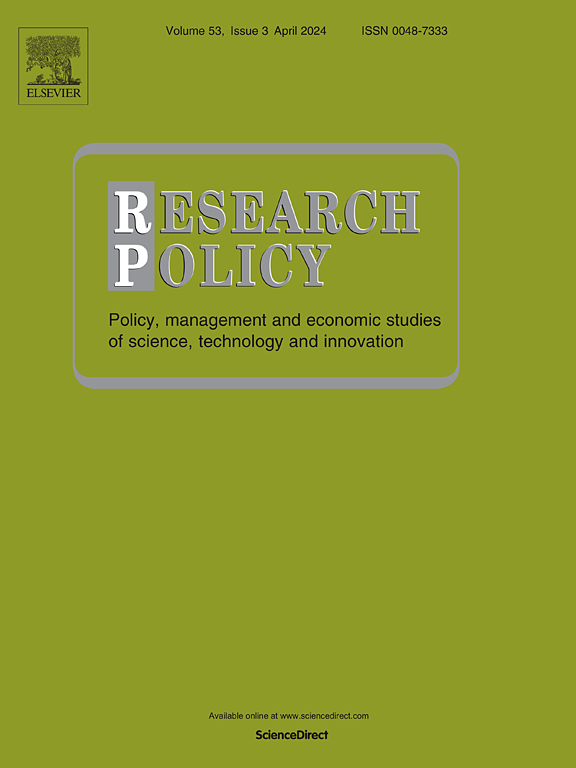How do CEOs seek advice from CMOs vs. CTOs in radical innovation decision making under uncertainty?
IF 8
1区 管理学
Q1 MANAGEMENT
引用次数: 0
Abstract
In situations of high uncertainty, Chief Executive Officer (CEO) advice seeking is of critical importance to access additional knowledge to inform their strategic decisions, such as in relation to radical innovation. Yet, little research has investigated the underlying mechanisms of CEO advice seeking in radical innovation decisions – especially when CEOs face conflicting advice. Using data from two discrete choice experiments (249 CEOs and 155 CEOs, respectively), complemented by ten qualitative interviews with CEOs, Chief Marketing Officers (CMOs) and Chief Technology Officers (CTOs), we investigate how conflicting advice from CMOs and CTOs affects CEO choices in radical innovation projects, contingent on various degrees of market and technological uncertainty. Subsequently, by using additional survey data (166 CEOs), we assess how external advice seeking affects the relationship between advice seeking from CTOs and CMOs and firms' radical innovation performance under market and technological uncertainty. Given conflicting CMO vs. CTO advice, our results indicate that when a radical innovation project is characterized by high technological uncertainty, CEOs are more likely to choose radical innovation projects that the CTO supports, even if the CMO does not. Yet, surprisingly, we do not find that CEOs' radical innovation decisions are affected by CMOs' supporting advice when an innovation project faces high market uncertainty. Finally, we find that the positive effect of CEO advice seeking from CMOs (CTOs) on firms' radical innovation performance is strengthened if the CEO also seeks external advice under high market (technological) uncertainty.
在不确定的情况下,在激进创新决策中,ceo如何向cmo和cto寻求建议?
在高度不确定的情况下,寻求首席执行官(CEO)的建议对于获取额外的知识来为其战略决策提供信息至关重要,例如与激进创新有关的知识。然而,很少有研究调查CEO在激进创新决策中寻求建议的潜在机制——尤其是当CEO面临相互矛盾的建议时。利用来自两个离散选择实验(分别为249位CEO和155位CEO)的数据,辅以对CEO、首席营销官(cmo)和首席技术官(cto)的10次定性访谈,我们调查了cmo和cto相互冲突的建议如何影响激进创新项目中CEO的选择,这取决于不同程度的市场和技术不确定性。随后,通过额外的调查数据(166位ceo),我们评估了在市场和技术不确定性下,外部建议寻求如何影响cto和cmo建议寻求与企业激进创新绩效之间的关系。考虑到CMO和CTO意见的冲突,我们的结果表明,当一个激进创新项目的特点是高技术不确定性时,即使CMO不支持,ceo也更有可能选择CTO支持的激进创新项目。然而,令人惊讶的是,当创新项目面临较高的市场不确定性时,我们没有发现首席执行官的激进创新决策受到首席营销官支持建议的影响。最后,我们发现,在高市场(技术)不确定性的情况下,如果CEO同时寻求外部建议,CEO寻求cmo (cto)建议对企业突破性创新绩效的正向影响会增强。
本文章由计算机程序翻译,如有差异,请以英文原文为准。
求助全文
约1分钟内获得全文
求助全文
来源期刊

Research Policy
MANAGEMENT-
CiteScore
12.80
自引率
6.90%
发文量
182
期刊介绍:
Research Policy (RP) articles explore the interaction between innovation, technology, or research, and economic, social, political, and organizational processes, both empirically and theoretically. All RP papers are expected to provide insights with implications for policy or management.
Research Policy (RP) is a multidisciplinary journal focused on analyzing, understanding, and effectively addressing the challenges posed by innovation, technology, R&D, and science. This includes activities related to knowledge creation, diffusion, acquisition, and exploitation in the form of new or improved products, processes, or services, across economic, policy, management, organizational, and environmental dimensions.
 求助内容:
求助内容: 应助结果提醒方式:
应助结果提醒方式:


